PRINCETON, NJ -- Compared with last month, Americans have become more likely to say the costs their family pays for healthcare will get worse if a healthcare bill passes. Forty-nine percent of Americans say this, up from 42% in September. Meanwhile, the percentage who expect their costs to improve is unchanged.
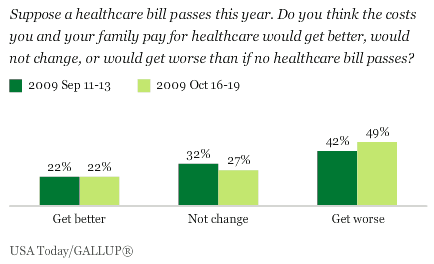
In addition to costs, a greater percentage of Americans now compared with last month also expect their healthcare situation to get worse in terms of the quality of care they receive (from 33% in September to 39%), their healthcare coverage (from 33% to 37%), and the insurance company requirements they have to meet to get certain treatments covered (from 38% to 46%).
"In general, Americans who are undecided on healthcare legislation predict it is more likely to make their own situations worse rather than better -- especially in terms of cost."
The Oct. 16-19 USA Today/Gallup poll was conducted as both houses of Congress move closer to a vote on healthcare reform legislation, including a key Senate Finance Committee vote in favor of a reform bill on Oct. 13.
But the poll finds no more than one-quarter of Americans believing their healthcare situation will improve in any of the four areas. And in each, substantially more expect the situation to get worse than expect it to get better if a healthcare bill passes.
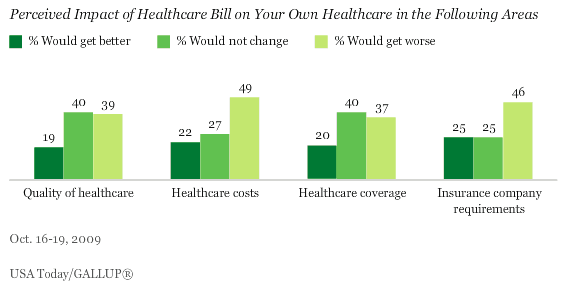
Even so, Americans are still quite open to healthcare reform -- 25% say they will support the final bill and another 39% say their support or opposition depends on the details of the legislation yet to be worked out. The views of this undecided group could be crucial to healthcare reform legislation's ultimate fate. And in addition to their preferences for possible policy elements of the legislation, discussed Tuesday on Gallup.com, their judgments of the impact the legislation might have on their own care could influence their decisions on whether to support or oppose the final bill.
In general, Americans who are undecided on healthcare legislation predict it is more likely to make their own situations worse rather than better -- especially in terms of cost (45% worse to 22% better), but in the three other areas as well. However, less than a majority in this group has negative expectations about any of the areas.
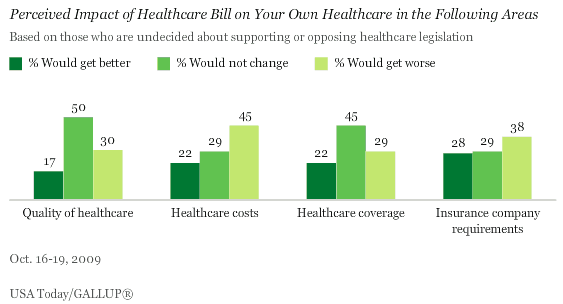
As would be expected, those who are outright opposed to healthcare legislation expect it to make their situations worse in all four areas by wide margins. At least two in three opponents believe their own costs, quality, coverage, and insurance requirements will get worse if a healthcare bill passes; fewer than 1 in 10 expect any of these to improve.
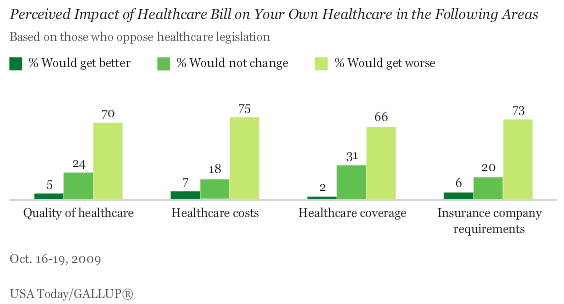
Those who are committed supporters of healthcare legislation are much more likely to belive it will make their situations better rather than worse, although this does not reach the majority level in any area. One-fourth or less expect their healthcare to get worse in any respect if reform legislation becomes law.
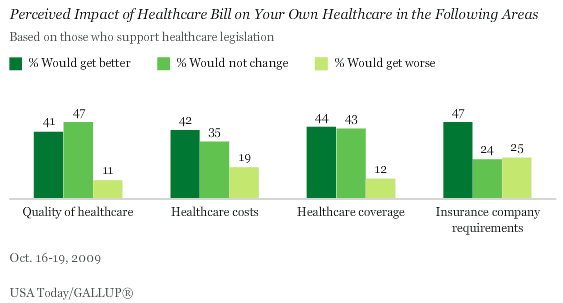
Thus, one reason Americans as a whole expect healthcare reform to do more to reduce than to improve their current healthcare is because reform opponents are more widely convinced of its potential negative impact on their current healthcare than supporters are of its potential positive impact.
Bottom Line
Although Congress is making significant progress toward passing healthcare legislation, there is still much work to be done to finalize the bill and build public support for such a new law. Americans are not solidly behind new healthcare legislation at this point, with polls showing at best a closely divided public. That level of support persists despite the fact that most Americans doubt reform will improve their current healthcare in a number of respects.
It is unclear whether, in order to succeed in passing healthcare legislation, the president and his allies need to convince Americans that their own healthcare will improve after reform is passed -- which is far from the prevailing view now -- or whether it is sufficient just to convince them that their care will not suffer while addressing some of the existing problems in the U.S. healthcare system. Since September, Americans have become more likely to believe reform would have a detrimental effect on their own care in terms of cost, quality, and coverage, but as of now, these views still fall below the majority level.
Survey Methods
Results are based on telephone interviews with 1,521 national adults, aged 18 and older, conducted Oct. 16-19, 2009, including an oversample of 408 blacks, consisting of 102 interviews done as part of the random national sample and 306 interviews with blacks who had previously participated in national Gallup polls and agreed to be re-interviewed at a later date. The data from the national sample and re-interviews are combined and weighted to be demographically representative of the national adult population in the United States and to reflect the proper proportion of blacks in the overall population. For results based on the total sample of national adults, one can say with 95% confidence that the maximum margin of sampling error is ±3 percentage points.
Interviews are conducted with respondents on land-line telephones (for respondents with a land-line telephone) and cellular phones (for respondents who are cell-phone only).
In addition to sampling error, question wording and practical difficulties in conducting surveys can introduce error or bias into the findings of public opinion polls.
